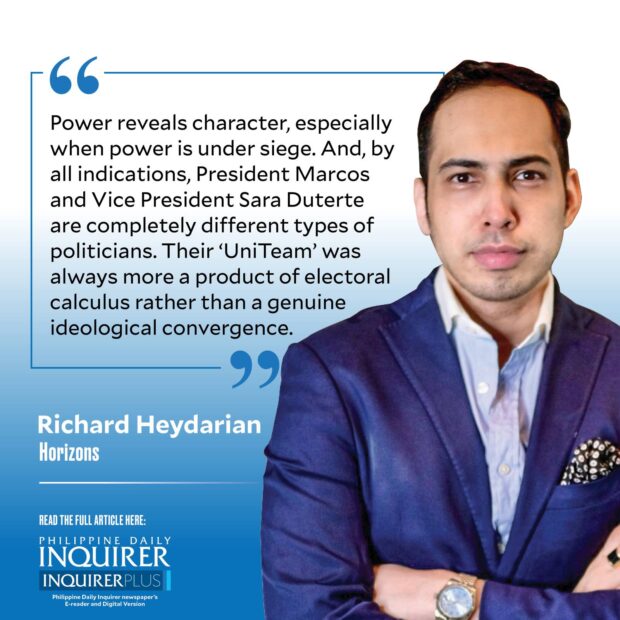Marcos and Sara Duterte: World of contrasts?

“I completely understand it, and that’s why we’re working very hard … What’s important to me is that we make sure that people have enough to eat and that it is affordable to them,” Mr. Marcos added, immediately clarifying that survey numbers were not his priority.
Now, dear reader, contrast Mr. Marcos’ response to that of Vice President Sara Duterte. While the commander in chief was almost apologetic, the occupant of the second highest elected office in the land went so far as to imply that her critics were “enemies of the nation” (kalaban ng bayan). Power reveals character, especially when power is under siege. And, by all indications, Mr. Marcos and Duterte are completely different types of politicians. Their “UniTeam” was always more a product of electoral calculus rather than a genuine ideological convergence.
The honeymoon is over. Just over a year into office, both Mr. Marcos and Duterte have shown that, unlike their fathers, they’re not above the laws of physics.
While Marcos Sr. oversaw one of the most dramatic economic collapses in the post-colonial world throughout the early 1980s, Rodrigo Duterte oversaw one of Asia’s deepest economic recessions in the 2020-2021 period. Both strongmen, however, were masters of “performative governance,” deftly projecting strong leadership and remaining surreally popular even as their actual performance was patently dubious.
In the latest Pulse Asia survey, which was conducted Sept. 10-14, Mr. Marcos saw a 15-point drop in his approval ratings. Among the poorest Filipinos (Class E), almost a third of his supporters (29 percent) switched sides amid persistent food inflation. As many as 56 percent of Filipinos disapproved of the Marcos administration’s handling of inflation.
Although Mr. Marcos still maintains a 65-percent approval rating, his numbers are way below those of Benigno Aquino III (77 percent) and Rodrigo Duterte (80 percent) at this point in their presidencies. Mind you, Mr. Marcos’ majority share of votes (almost 60 percent) last year was significantly higher than both Aquino’s and the elder Duterte’s.
Seeing the writing on the wall, Sen. Juan Miguel Zubiri advised his friend in Malacañang to “crack the whip” against those dragging the President down. In many ways, Zubiri’s remarks echoed Sen. Nancy Binay’s peculiar lamentation earlier this year about the lack of “fear factor” under Mr. Marcos, who “seems [too] kind” but, going into his second year, it will be “more appropriate for him to get angry [at times].”
Instead of indulging in demagogic antics, however, Mr. Marcos responded with a combination of toughness and pragmatism. He reversed the ineffectual price caps on rice, which was heavily lambasted by economists and businessmen while filing charges against alleged food hoarders manipulating market prices. He also pondered a replacement at the Department of Agriculture, thus his curiously timely confab with former senator and technocrat Manuel “Mar” Roxas in Capiz. A “grand coalition” in the works?
As for Sara Duterte, she has been quintessentially … Duterte! Faced with declining approval ratings, which would have likely been even more dramatic had the survey been conducted in late September, the Vice President lashed out at critics of her confidential fund.
“Anyone who attacks or undermines funds allocated for peace and order is naturally assumed to have insidious motivations,” she declared. “Whoever is against confidential funds is against peace. Whoever is against peace is an enemy of the state.”
Not only did she refuse to directly respond to legitimate questions surrounding the logic and circumstances of her office’s gargantuan confidential funds, but the Vice President was also quick to attach “insidious motivations” to her critics. In response, she was accused of gaslighting and Red-tagging by her progressive critics in the legislature. Upon closer examination, however, it’s clear that this was a classic case of securitization, namely deliberate suppression of rational, evidence-based discourse in democratic societies by invoking national security.
Gladly, the President’s allies in the legislature have had the forethought to switch gears and, accordingly, consider reallocating confidential funds to the agencies, which are designed and trained to defend our nation, including the West Philippine Sea.
—————-
rheydarian@inquirer.com.ph




















